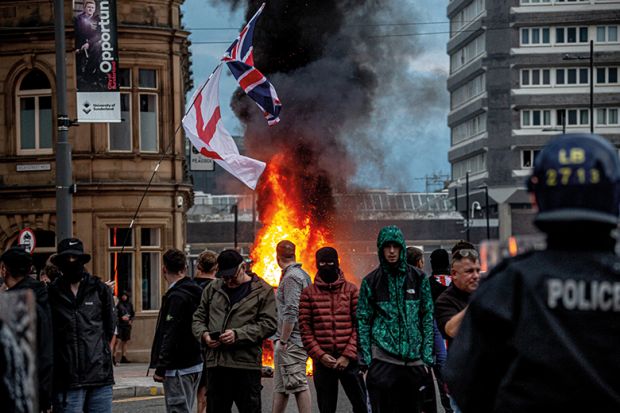Unrest in cities across the UK could further damage the country’s reputation in the eyes of prospective international students after a period of political turbulence, it has been warned.
Some governments, including key student source markets, issued warnings advising citizens to exercise caution when visiting the UK in the wake of August’s far-right, anti-immigration riots targeting mosques and hotels housing asylum seekers.
India’s High Commission in London told nationals to “stay vigilant” and “avoid areas where protests are under way”, while Nigeria’s Ministry of Foreign Affairs warned that violence has “assumed dangerous proportions” with “Muslim immigrants or persons of colour being targeted”.
Malaysia, Indonesia and the United Arab Emirates also issued similar warnings just weeks before thousands of international students were expected to travel to the UK for the start of the academic year.
While the protests now appear to have died down, education agents warned that these events could leave students once again questioning whether to study in the UK after a shaky period for international student recruitment.
“This could have an impact on the present intake,” said Sushil Sukhwani, director of India-based agency Edwise International. “It will surely create anxiety amongst students and parents from India irrespective of community.”
Sadiq Basha, chief executive and founder of Edvoy, said the organisation’s teams in south Asia, Africa and the Middle East had been approached “by friends and recruitment partners who have expressed concerns regarding the situation”.
“There is a lot of misinformation being shared, and…students and their families will be very concerned about their safety,” he said.
“The videos and news coverage have been widely circulated on social media, further amplifying the concerns.”
Adam Pettit, director of partnerships at AECC Global, said the riots were “detrimental to the UK’s reputation in the eyes of students and parents”, but, speaking about student sentiment in Malaysia, the first country to issue a travel warning, said, “students are persistent and if they want to go, they will go”.
Similarly, Mr Basha said no students had withdrawn their applications yet, while Akshay Chaturvedi, chief executive of Leverage, agreed that although there had been “questions”, recent events were yet to affect students’ decision-making.
Since being elected, the new Labour government has made efforts to reassure international students that they are welcome in the UK after a period of political turmoil, but the unrest is seen by some as a step back.
“After a period of negative publicity from the UK and uncertainty around the graduate route, things were starting to look more optimistic this summer, so it’s unfortunate the anti-immigration riots have started just as the UK market was picking up,” said Mr Pettit.
Research from student recruitment giant IDP has shown how important perceptions of safety are to international students when choosing where to study. In a 2024 survey of 11,500 prospective, current and completed students, safety was the third most important factor for students’ decision-making, after the quality of education and employment opportunities.
“Student safety is a critical factor in students’ decisions to study abroad,” said Janet Ilieva, founder of the consultancy Education Insight. “It is fair to assume that safety would be even more important to their parents, who are likely to be the main funders and significantly influence their children’s study choices.”
The IDP research also found students were likely to switch their preferred study destination as a result of issues in their original choice. The majority of those surveyed had changed their mind about their first-choice destination since deciding to study internationally, with students who had indicated the UK as their first choice most likely to rethink. Among all respondents, 45 per cent said concerns about the safety of international students had led them to change their minds.
In the wake of the protests, universities have been keen to emphasise that the UK remains a safe and welcoming place for international students.
Stuart Easter, director of student recruitment and international at Edinburgh Napier University, said the institution had not received any enquiries from international students about these incidents but was “proactively offering support and guidance to new students who may have concerns about this, to reassure and remind them of the support services we have in place and to ensure students feel welcome during their studies”.
Dr Ilieva said current university students were “the most trusted source of information” for prospective students. “By proactive and culturally sensitive communication with students and their parents, universities can help them feel safe and supported during a difficult time. The well-being and safety of current students are perhaps the most impactful means of reassuring prospective students,” she said.
后记
Print headline: UK riots spark fear for international enrolments




